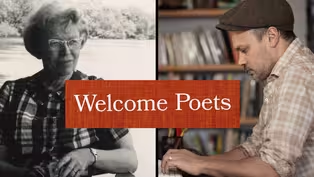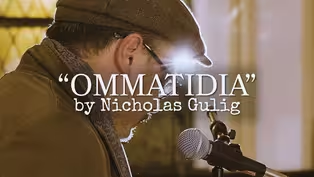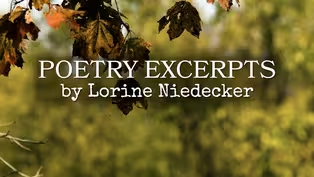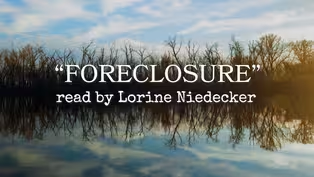
Nicholas Gulig: “Ommatidia”
Clip: Season 2025 | 9m 9sVideo has Closed Captions
Former Wisconsin State Poet Laureate Nicholas Gulig reads his poem "Ommatidia."
Former Wisconsin State Poet Laureate Nicholas Gulig reads his poem "Ommatidia," an introspective and lyrical exploration of issues political and personal, at a poetry reading in Madison, Wisconsin in November 2023. "Ommatidia" appears in Gulig's award-winning poetry collection, "The Other Altar."
Problems playing video? | Closed Captioning Feedback
Problems playing video? | Closed Captioning Feedback
Welcome Poets is a local public television program presented by PBS Wisconsin
Major funding for "Welcome Poets" is provided by the Fort Atkinson Community Foundation, Peter and Connie Roop, the Focus Fund for the Arts and Friends of PBS Wisconsin.

Nicholas Gulig: “Ommatidia”
Clip: Season 2025 | 9m 9sVideo has Closed Captions
Former Wisconsin State Poet Laureate Nicholas Gulig reads his poem "Ommatidia," an introspective and lyrical exploration of issues political and personal, at a poetry reading in Madison, Wisconsin in November 2023. "Ommatidia" appears in Gulig's award-winning poetry collection, "The Other Altar."
Problems playing video? | Closed Captioning Feedback
How to Watch Welcome Poets
Welcome Poets is available to stream on pbs.org and the free PBS App, available on iPhone, Apple TV, Android TV, Android smartphones, Amazon Fire TV, Amazon Fire Tablet, Roku, Samsung Smart TV, and Vizio.
Providing Support for PBS.org
Learn Moreabout PBS online sponsorship[car engine roaring] - Nicholas Gulig: In Keats's letters, the poet makes a specter of his aesthetics.
Beauty should obliterate.
As the riots burn in Minneapolis, I plant bee balm with my daughter in our yard.
Because my friend in prison helps white supremacists write letters to their lovers and blinks himself to sleep, the police lights rising from the streets like little tongues beyond the dead insistence of their song upend the dumb capacity for grace.
What must we forgive?
To see a single flower in a field of other flowers, Keats insists that we abandon our identity.
The lynching ruptured everything.
To sustain the colony, a worker bee goes forth in early light and lingers.
Sitting in the grass, we listen, the drone of tiny wings adrift between the patchwork patterning of violets, a kind of language glittering.
At first, my daughter is afraid.
When the open field between a thesis and its antithesis evaporates, Keats insists the arguments regarding art begin to dovetail in the mind.
I want to think that he is right, the light of a convergence arriving on an altar I imagine centered somewhere in me like a soul.
The city burning on a livestream while I send messages to friends illuminates my living room.
When my daughter pushes seeds into the dirt, she asks if she is hurting it.
A violent brightness casts a dark catastrophe across the wall.
Capable of seeing ultraviolet light, the sun despite the clouds, the compound eyes of bees are covered with tiny follicles that sense the wind's direction.
A disquisition, not dispute, on a myriad of subjects strikes me.
I try to write a letter to my friend and find myself instead among a numb cacophony of distances, admitting my mistakes.
What is true enough to render?
This, for Keats, is the burden of the mystery, a liberating doubt.
When my daughter asks if cops are bad, I grab her hand and say that in the morning we'll check to see if anything has sprouted.
This pursued through volumes eliminates the call of all consideration.
How beautiful the retired roses folding over in the night-wind, breaking.
How fact and reason seem to fall away, my faith in people, the pistil and the stigma and the seed.
When the workers first emerge, their hair is edged in silver and their wings are soft, paper-thin and crumbled.
I tire early in the aftermath and think it sad that the specific composition of ommatidia varies between organisms, the world appearing differently as a matter of blind mechanics.
When I drive across the country to see my friend in the Elkton Federal Correctional Institution, I stand in a line of children in the jail yard waiting with their mothers to see their dads.
All of us are earthdark.
I find I cannot exist, says Keats.
It is easier to say what poems should be than write them.
And so I find myself suspended in a landscape made of years and long apologies.
In the prison cafeteria, my friend says the thing that shocks him most is how illiterate the inmates are.
Queen bees brood their eggs like birds and place them in a pollen ball.
When my daughter comes home from school, she asks if the police would ever hurt her mother and then we sit in silence.
The silence ruptures us, a thing we cannot see that enters slowly through the ear and lingers, a wilderness approaching the immediate emergency of wreck, not a self so much, a subject.
Thus, the music of the poem is what the mouth becomes when language leans into uncertainty.
Language is imaginary.
Every morning, when I wait in line in the Luther Elementary parking lot among the other parents dropping off their kids, I count the thin blue line police flags plastered to the metal bumpers of their trucks.
Colonies exist to feed the queen's demand for sweetness, and this, too, is a kind of silence lingering.
I want to tell my daughter about the summer I was 17 in Minneapolis, a punk show at a venue called the Bomb Shelter, how the cops came in and punched the brown kid standing next to me.
In my memory, my mind goes blank on impact, my body acting on its own.
For the first time, I find myself beyond myself, the crowd erupting all around me and spilling out onto the streets of the same precinct burning on my phone today some twenty-odd years later.
I want to tell her that my friends together picked me off the ground and took me to the hospital, but instead I tell my students that the poet is at once the possessor and the possessed, the colonizer and the colonized, and that for Keats, language, when it is working, takes away your name.
It surprises me to learn that bees have five eyes, three of which see only shadow, but not the shape that casts it.
Maybe this is beautiful; vision is diverse.
O for a life of sensation rather than of thought.
Every autumn, the flowers we have planted start to fall apart, folding inward toward a center that is only partially there.
My friend is out of prison.
He's married now and has a daughter of his own.
Every month he sends me records in the mail with little notes explaining his experience of song.
Since an image from the compound eye is created from a set of independent elements, bees can only see that part of the picture directly there in front of them.
It is difficult to know the world as someone other than yourself, to sense through nothing more than shadow there is in you a garden somewhere planted by a stranger, where the spirit you imagine passing through you glides against another person's body like a ghost.
Keats believes that if the poem does not come naturally, like leaves to a tree in spring, it should not come at all.
The riots rise and fall around my daughter like a century.
The average lifespan of a worker bee is six to seven weeks.
My dreams do not relieve me.
In time, the workers cross the distance from one flower to another, heading home to feed the queen, their wings deteriorate, battered by a wind that used to carry them.
Laughing in a pool of pollen-colored light, my daughter sings my name and arranges yellow petals in a circle at my feet.
In the chamber of our maiden-thought, Keats forewarns a darkening.
The police are everywhere.
My daughter tells me I am standing in the sun Thank you.
[audience applauding and cheering] [car engine roaring]
Preview: S2025 | 1m | Nicholas Gulig explores place and belonging through the legacy of Wisconsin poet Lorine Niedecker. (1m)
Video has Closed Captions
Clip: S2025 | 9m 9s | Former Wisconsin State Poet Laureate Nicholas Gulig reads his poem "Ommatidia." (9m 9s)
Nicholas Gulig: “Book of Shore”
Video has Closed Captions
Clip: S2025 | 4m | Wisconsin Poet Laureate Nicholas Gulig narrates his poem "Book of Shore." (4m)
Lorine Niedecker: Poetry Selections
Video has Closed Captions
Clip: S2025 | 2m 9s | Three brief excerpts of poetry from the late Wisconsin poet Lorine Niedecker. (2m 9s)
Lorine Niedecker: “Foreclosure”
Video has Closed Captions
Clip: S2025 | 1m | The late Wisconsin poet Lorine Niedecker reads her poem "Foreclosure" in a 1970 recording. (1m)
Providing Support for PBS.org
Learn Moreabout PBS online sponsorship

- Arts and Music
The Best of the Joy of Painting with Bob Ross
A pop icon, Bob Ross offers soothing words of wisdom as he paints captivating landscapes.












Support for PBS provided by:
Welcome Poets is a local public television program presented by PBS Wisconsin
Major funding for "Welcome Poets" is provided by the Fort Atkinson Community Foundation, Peter and Connie Roop, the Focus Fund for the Arts and Friends of PBS Wisconsin.





